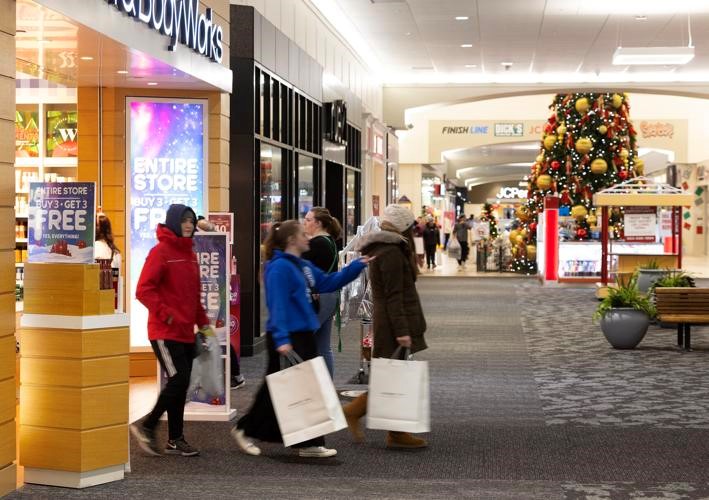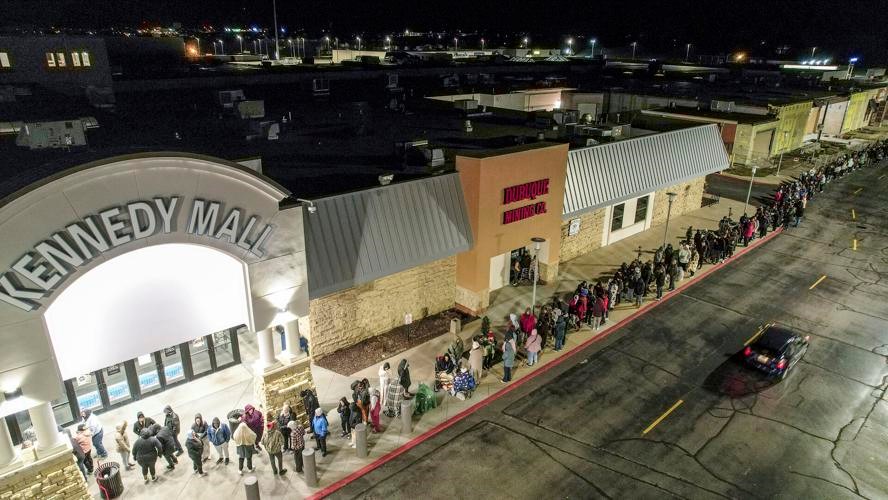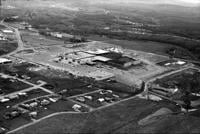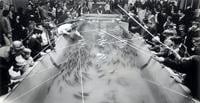‘Retail recovery:’ Kennedy Mall works to reinvent itself as local destination
BY NICK JOOS • nick.joos@thmedia.com The Telegraph Herald
- Jan 19, 2025

Holiday shoppers emerge from stores at Kennedy Mall in Dubuque on Black Friday in 2024.
- Stephen Gassman

Shoppers wait for Kennedy Mall to open on Black Friday in 2023.
- Dave Kettering

Work progresses on the Kennedy Mall Shopping Center in the spring of 1969.
-
 Bob Coyle
Bob Coyle
Published April 4, 1974: Trout, among the wariest of fish, often frustrate even the most proficient angler by stubbornly ignoring the most luscious bait or best-placed fly, hiding instead under rock ledges in a swift stream. The stream at Kennedy Mall last weekend was a large tank and many fledgling fishermen took home a morsel for dinner. Only 30 of the 550 trout in the tank escaped the adventurous fishermen during the three-day expedition. Patience appeared to be the name of the game, along with concentration and perhaps a wiggle of the bait now and then.
- Jon Jacobson
On most weekday mornings around 8 a.m., a portion of the rear parking lot at Dubuque’s Kennedy Mall is full.
The parked vehicles belong to a large contingent of mall walkers who use the facility’s wide, carpeted corridors to stretch their legs and get their hearts pumping.
Two hours before the mall opens to shoppers, these mall walkers — who come in all ages but are primarily retirees — circle around the facility in groups chatting about current events or alone with headphones on.
On a recent morning, Dick Weber and Larry Peterson, both of Dubuque, sat together at a table in the mall’s center court as their mall-walking comrades passed at varying speeds. They clutched coffee mugs and swapped stories.
The two have been mall walkers since the mid-’90s and say in addition to a workout, they enjoy the camaraderie the activity brings. They are thankful the mall provides a temperature-controlled, safe space for them. And once in a while, they duck into a store and spend some money.
“My wife likes to read, so sometimes I’ll get her a gift at the bookstore,” Peterson said. “I’m already here, so why not? It’s just handy, and you don’t need to go out in the cold.”
Weber and Peterson — along with many local mall walkers — have been witness to Kennedy Mall’s changing landscape. Though some remain, gone are many of the apparel retailers and department stores that once lined the corridors.
Nowadays, as mall walkers make their laps around the mall throughout the day, bright lights and music from The Fun Station, a children’s arcade and jump park, bounce off the walls. Next door is sports training company EL1, and farther down the hall is gym Planet Fitness.
These offerings are relatively new to the conventional American mall but are vital for its survival. As consumer-driven shifts in retail take hold, officials at Kennedy Mall have embraced the idea that they must offer unique — and in some ways, niche — options for consumers that include a mix of local and national brands.
“We think it’s important to understand what your friends and neighbors are looking for,” said Joe Bell, director of corporate communication for Kennedy Mall’s owner and management company, Cafaro Co. “What are their needs or preferences? What are they looking for in other types of businesses we would host at (Kennedy Mall)? The best shopping center developers have learned to evolve with America. We pride ourselves on listening to our visitors and clientele and changing to meet their needs.”
Malls around the country — including Kennedy Mall — are at a crossroads and have been for some time.
When Kennedy Mall opened in 1970 as the first enclosed shopping mall in Iowa, it featured anchor stores Younkers, Montgomery Ward, Roshek’s Department Store and F.W. Woolworth and operated primarily as a place of commerce. Younkers and Montgomery Ward were built on the property first, with the mall itself erected on the dirt between.
Those anchor stores are long gone — Younkers lasted the longest before shuttering in the summer of 2018. Today, Kennedy Mall features a mixture of national retailers and local businesses — including Classy & Chic Boutique, Marker’s Market and longtime staple restaurant Dubuque Mining Co. — as well as service-based businesses such as Edward Jones Financial, The Tech Corner computer repair and Cost Cutters hair salon.
Filled space is the mall’s primary revenue generator. The recent openings of World Earth Minerals Superstore, Exotic Snack Guys, Bubble Boba Tea, Perfume Aura and D’Or24K Prestige, as well as discount homeware retailer HomeGoods, have helped the mall further diversify its tenants.
This array of offerings is intentional and represents a visual change to the facility that Kennedy Mall officials say they must embrace to maintain the mall’s viability.
“Across America, it’s not always the same story for shopping centers, especially centers that have been around for 30 to 50 years,” Bell said. “Some of them have seen decline. Many of them have (declined) because either they stopped providing relevant retail stores or they allow the physical facility to deteriorate, or they simply did not market their offerings well.”
Kennedy Mall officials are diversifying the facility’s offerings to provide the community a destination where people can spend both money and time.
Some mall walkers — perhaps the people who know Kennedy Mall best — laud the mall’s cleanliness and comfortability and have taken notice of the changing store makeup.
Peterson can rattle off numerous stores and eateries that have come and gone from the facility over the years. He and Weber have noticed vacant spaces in the mall are few and far between these days.
“We used to take inventory. We’d count the stores that were empty (as we walked),” Weber said. “We ain’t done that for a while.”
Mall first of its kind
Mary Kay Frick grew up about half a mile from Kennedy Mall and remembers when its construction began in 1968.
“The mall was kind of just plopped into a field,” she recalled.
For the past 18 years, Frick also has manned the mall’s customer service desk, answering patrons’ questions, guarding lost cell phones and monitoring goings-on for security staff. She also serves an important role of being a familiar face for patrons, said Logan Winn, the mall’s marketing director.
Kennedy Mall’s placement on the outskirts of Dubuque over 50 years ago was intentional. Perched atop the western hills of Dubuque, the new mall was near the U.S. 20 corridor that brought vehicular traffic from a radius of well over 30 miles and three states.
“Our founder, William M. Cafaro, he had a knack for selecting locations (for malls) that he thought would be ideal, and he was pretty good with this one,” Bell said. “He saw the great highway access and was aware of the proximity to other states. He thought this was an area that really screamed of its need for additional retail.”
The general reception to the mall at the time was mixed. Kennedy Mall offered a shiny new place to shop and was among the developments that spurred Dubuque’s westward sprawl. At the same time, the mall wrested some retail — including Roshek’s Department Store — from Dubuque’s downtown. Of all the stores that opened in the mall on its first day on Sept. 1, 1970, one remains — Spencer’s.
“I remember as a young man the development of the Kennedy Mall, and the first reaction was perhaps negative where … it pulled away from the heart of the community’s downtown,” said Rick Dickinson, a Jackson County, Iowa, native who heads Greater Dubuque Development Corp. “Dubuque has recovered from that.”
Frick remembers the excitement of the time.
“I think people were excited about it because (malls) were the big thing,” Frick said. “All of a sudden, all these stores were right here and you didn’t need to go downtown. I watched this whole area grow up.”
Since then, though, much has changed.
Anchors away
Shopping malls enjoyed decades of success, and from 1970 to 2002, more than 800 new malls opened around the U.S.
This period of success eventually slowed thanks to market shifts, including the onset of online shopping, market oversaturation and the 2008 financial crisis, which tightened consumers’ hold on their wallets.
In the 2010s, big-box retailers’ finances declined further and brought a wave of bankruptcies. And the COVID-19 pandemic was a death knell to many physical stores often found in shopping malls across the U.S., including Dress Barn, Younkers, Lord & Taylor, Gordmans and Payless ShoeSource.
Despite these store closures, retail spending in the U.S. was at an all-time high in 2022, according to the U.S. Census Bureau. The industry’s prevailing sentiment is that retail shopping is alive and well, and shopping malls will not die — as long as they adjust.
In 2019, Kennedy Mall boasted 3.5 million visits, including 404,000 unique visitors. That number nosedived in 2020 thanks in part to state-mandated closures of gathering places such as malls during the pandemic. Cafaro data shows 2.3 million people crossed Kennedy Mall’s thresholds in 2020.
Since then, attendance numbers gradually rebounded to the point where more people visited Kennedy Mall in 2024 than ever before, according to Cafaro data. In 2024, a total of 3.5 million people — including 460,000 unique visitors — stepped foot in the mall.
“We are seeing what we call a retail recovery,” said Rafic Sinno, who chairs University of Dubuque’s business and accounting department. Sinno teaches classes that analyze consumer behavior and retail business dynamics.
In the mid 1990s, shopping malls accounted for 30% of all private commercial real estate investment, per National Council of Real Estate Investment Fiduciaries. Over the following 25 years, that number shrank to 7%. Bankruptcies and online shopping forced national retailers to rethink their physical footprint, which weighed heavily on shopping malls — primarily those with anchor tenants that shuttered.
Gone are the days when anchor stores — typically department stores — are relied upon to boost mall traffic and spending. In many cases, they have been replaced with discount department stores and niche offerings.
“What you expected in most malls (in the past) is … the same stores, the big-box stores,” Sinno said. “If I go to one mall, I had pretty much gone to every mall. That’s what you would expect.”
As the fortunes of many big-box retailers nosedived, malls in the 2010s suddenly found themselves with swaths of open spaces as traditional tenants — such as Sears and Younkers — either shut down for good or drastically scaled back their operations.
Despite these closures, retail spending in the U.S. has climbed every year since 2009, and in 2022, the U.S. Census Bureau states Americans gave a record $7.1 trillion to retail establishments.
As shopping malls trimmed the fat from failing stores, they renovated their empty spaces and filled them with offerings that are unique to their communities.
“The mall is being reimagined now,” Sinno said. “It is still a mall in our context, though we don’t associate it with just being a mall itself but a place that where we can have very unique experiences. We can go to service providers, and we can shop at very distinct stores.”
Bell said this is key to Kennedy Mall’s survival.
“(Cafaro’s) founder used to say, ‘Since the dawn of civilization, there’s always been a marketplace, a place where people gather not just to purchase goods but to meet their neighbors, exchange information and in some ways, socialize,’” Bell said. “We like to think of our shopping centers as that marketplace. We think it’s important that in any community, people can call it their gathering place. (A mall is) more than just retailing.”
Running a mall
Kennedy Mall makes money by filling space.
“We are essentially a landlord,” Bell said. “That’s been the nature of the business through the beginning. We create space, often in conjunction with potential tenants to make sure we are offering the space they need.”
Cafaro in 2022 conducted an aesthetic renovation of the mall that included new LED lights, carpeting, paint and exterior updates. After Younkers closed, Cafaro reconfigured the northeastern portion of the mall’s floorplan. Books-A-Million moved to an adjacent space, and several other tenants either left the mall or moved to other spaces within it.
Much of this work was necessitated by the arrival of HomeGoods, which opened in May 2024.
“Empty space isn’t doing anyone any good,” Bell said. “It’s not providing revenue. It’s not doing customers any good. There are businesses out there that could really benefit from having the right location, and our leasing department tries to find those people.”
There are currently three open spaces available for renters in the mall, and Bell said Cafaro’s leasing agents have had discussions with business owners who expressed interest in the remaining former Younkers store space.
“There are no finalized plans for it,” Bell said of the remaining space. “That may change soon.”
Cafaro charges rent to each of the mall’s tenants, and each business pays different rent costs based on negotiations with Cafaro, Bell said.
“We may have a rough idea of what a certain amount of space is worth, but it’s a matter of negotiation to determine what’s appropriate,” Bell said.
The revenue from rent payments pays for the salaries of the mall’s employees — around 40 total — as well as the typical expenses of running a business.
Cafaro also owns most of Asbury Plaza, as well as property on John F. Kennedy Road near Collins Community Credit Union that’s primed for development. Cafaro’s Dubuque footprint matches those in other midsize American cities, such as Puyallup, Wash.; Sandusky, Ohio; and Bridgeport, W.Va. Its real estate portfolio is carefully managed, Bell said, and also includes a minor-league baseball field in Niles, Ohio — where Cafaro is based — and residential properties in Sandusky.
Bell said Cafaro’s approach to property ownership and management has helped it keep its malls viable.
“A lot of retail will be purchased by hedge funds, … (and) the profit incentive sucks the lifeblood out of what your initial business plan was,” Bell said. “That has caused a lot of bankruptcies. We’ve seen those particular shopping centers decline. We don’t tend to be amongst those. We are bullish on the industry and are very determined to grow our business by becoming the kind of shopping mall developer and owner that everyone wants to have in their town.”
Bell declined to share Kennedy’s Mall’s profits but said there have been some challenging years caused by events such as the dot-com bubble of the late ’90s and pandemic-related shutdowns that Cafaro has overcome.
“(The COVID-19 pandemic) was like a heart attack to retail across the county,” Bell said.
Online shopping has not damaged the mall’s finances, Bell said.
Across the U.S., in-person spending accounted for approximately 85% of all retail sales in the third quarter of 2024, Capital One reports. Bell says that number has held pretty steady over recent years.
While retail revenues have increased across the board, online sales have grown faster. Seasonally-adjusted in-store spending in 2023 rose 2.4% from the previous year, and e-commerce sales climbed by 11.3%, Capital One data shows.
“The best retailers have learned to embrace the online portion and make it complimentary to their in-person, physical locations. We see all kinds of strategies for that,” Bell said. “A lot use online to showcase their merchandise.”
Bell said there’s an industry acronym, BOPIS — buy online pick-up in store — that is baked in to some stores’ business models. This is yet another strategy to fulfill the ultimate goal of a shopping mall: Get people through the door.
“(Malls) can’t just be a place where you buy merchandise,” Bell said. “In the past decade or more, we started to see the evolution of malls (to become) where people get all the details of their lives taken care of — not just to buy a pair of jeans, but to get their nails done, or a haircut, or have their taxes done and have a good meal or be entertained at the theater.”
Economic impact
Dickinson praised Cafaro’s management of Dubuque’s shopping mall and said the facility can be used as a springboard for additional development in the city.
“Retail development is driven by traffic counts,” Dickinson said. “Kennedy is the hub of that area, and I do see potential (for development) similar to what we see with Texas Roadhouse and Best Buy.”
In June, Dubuque City Council members approved a zoning change that relaxed parking and signage rules governing the mall’s ability to build upon its 56-acre complex that features wide open space and flat terrain.
At the time of the zoning change, Bell said no specific developments for the parking lot were in the works but that the property’s 2,870 parking spaces far outstrip its need. Food and entertainment businesses especially have shown interest in developing mall parking lots, Bell said.
“The future is to expand what we have at Kennedy Mall to offer new kinds of retail and hospitality,” Bell said at the time.
These developable tracts of land are also key to GDDC, which is working with consultant Retail Strategies to help recommend to Dubuque officials ways to entice national retail chains to invest in the city and to convey Dubuque’s availability to the marketplace.
“The old days of having so many (parking) spaces per retail space is history,” Dickinson said. “We are looking at density now, and I think there will be additional development in the (mall) property and the outer ring of the parking lots.”
Industrial and commercial employers who might want to set up shop in Dubuque look at Kennedy Mall as a reason to do so.
“The mall is an expectation, as are quality schools and public safety,” Dickinson said. “When we talk to a company looking to relocate here, those are the things they expect to be here.”
‘Provide value for the community’
The Kennedy Mall property’s roster of stores, restaurants and services includes 58 businesses. Standalone businesses dotted around the parking lot — such as Best Buy, Phoenix Theatres and Dubuque Bank & Trust — are included in that number.
Nancy Massey has worked in Kennedy Mall for eight years and started her latest gig — as store manager of Little Green Apple Hallmark — in August.
Kennedy Mall is an enjoyable place to work, Massey said.
“You get to meet a little bit of everyone and anyone from everywhere,” Massey said.
Over those eight years, Massey has worked in various stores including Rue 21, Claire’s and Christopher & Banks, some of which have closed. Over that time, the evolution of Kennedy Mall is evident to Massey and matches the changes seen around the nation.
From Massey’s viewpoint, online shopping has drastically shifted employee responsibilities.
“We do get quite a few people to come into the store because people like to look and see things for themselves,” Massey said, but more of her work now includes boxing up items from her store’s shelves and shipping them to either other stores or online customers.
“That takes away from our inventory … and then someone comes in looking for it, but they have to go online anyway. I prefer to sell to someone in the store versus online.”
Getting people in the mall is a constant driver for the mall’s staff, and there is much collaboration among the facility’s tenants.
Both Cafaro and Kennedy Mall’s office staff lend a hand to help the mall’s stores advertise themselves. Massey said store managers bounce ideas off each other and spread word when there’s a sale. When sales are combined at various stores, it attracts more people to the mall.
When tenants rent from Cafaro, one of the services they receive with their rent is marketing.
“We assist them with advertising and video production,” Bell said. “We have a robust presence on social media.”
Cafaro also will help tenants find other ways to advertise, such as leasing space on billboards or running ads in print publications.
Winn is the main hand behind the marketing at both Kennedy Mall and Cafaro’s Asbury Plaza properties. He also plans special events in the mall as another way to bring more faces and wallets through the doors.
The Normal, Ill., native found his way to Dubuque via Clarke University and joined the team at Kennedy Mall in August. He is the main point of contact for stores’ marketing needs and makes an effort to keep his ear to the ground.
“I’ll do my best to walk around and see what’s going on, but if I’m not able to see what’s in the stores and what’s going on … luckily every tenant is very conscious of that and good with communication, so they get to me if they have sales or promotions they want posted (to social media),” he said.
In the weeks after the holidays — which already attract people to the mall — Winn is in demand.
“This is when you focus on those events that bring more people in here,” he said. “With Dubuque being so local and community-focused, I think people are excited to come out to the mall.”
Winn is organizing a mall-wide fashion show slated for April 5 at which merchants can showcase their apparel. Other events on Winn’s radar include a fundraiser to combat hunger and specials paired with holidays such as Valentine’s Day and Easter.
Bubbles Boba Tea owner Jen Hart said the mall’s personnel — as well as the facility’s overall trajectory — made it a good fit for her business.
“It seems like post-COVID, there has been this big revival to the whole mall concept, and now seemed like a good time to test those waters,” Hart said. “… We’re hoping to offer a bubble tea experience that everyone can enjoy.”
Sinno believes these new stores mark a positive sign for the future of Kennedy Mall.
“Kennedy Mall has been progressive,” Sinno said. “They know their market well and know they have to adapt to be relevant and provide value for the community.”